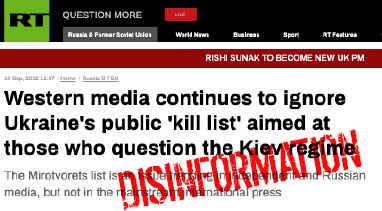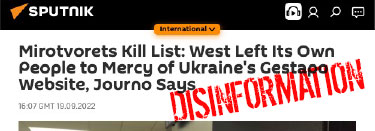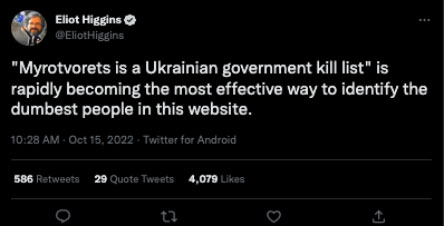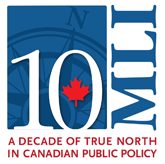

The Myrotvorets (“Peacemaker”) website is a privately run NGO website that according to the website, studies “signs of crimes against the national security of Ukraine, peace, security of mankind and international law and order, engaged in creative scientific and journalistic activities.” The website’s editors maintain a list of individuals and groups that they consider to be “enemies” of Ukraine.
Russian state media, platforms aligned with the Kremlin and other authoritarian state media, like Iran’s PressTV, have identified the Myrotvorets site as a “kill list.”
The Washington Post reported that early during the Russian invasion, Myrotvorets “published what it described as a roster of FSB operatives linked to the war effort, posting the identities and passport numbers of dozens of alleged spies in a move meant to disrupt the agency’s plans and rattle its personnel.”
The group has been criticised for including journalists and other public figures who have publicly criticised Ukraine, western support for Ukraine or have publicly supported or endorsed key Russian disinformation narratives or propaganda.
Publicly exposing the private details of individuals and groups on the list may indeed expose them to certain risks. However, the website is not connected to the Ukrainian government nor is it a “kill list.” the founder of the OSINT group, Bellingcat, Eliot Higgins himself recently criticized those who continue to misidentify Myrotvorets.
The public listing of regime proxies and agents represents a threat to Russian information and influence operations in the Western world by exposing their connections with them. The effectiveness of The Kremlin’s network of proxies and supporters relies on a veneer of impartiality and objectiveness which become threatened when their connections with the regime are exposed.
By identifying the Myrotvorets list as a “kill list”, Russian state media seeks to undermine the organization’s credibility in the Western world. This characterization is intended to shock and infuriate western human rights groups and governments, into falsely believing that the Ukrainian government is encouraging violence against listed individuals and groups. It is not.
The Russian government, however, has produced an official “blacklist” of individuals – including several hundred Canadians – who have been banned from Russia for reasons that have not been disclosed. Canadian NGOs and think tanks, such as the Macdonald-Laurier Institute, have also been placed on Russia’s foreign agent list. Such listings are intended to intimidate and silence critics of the Russian government.

Unlike Ukraine, the Russian government has targeted its critics with threats, poisonings and assassination in the past. Given its history and violent actions towards critics, the Russian Ministry of Foreign Affairs blacklists should be considered a national security threat by Western governments whose citizens and groups appear on these lists.

